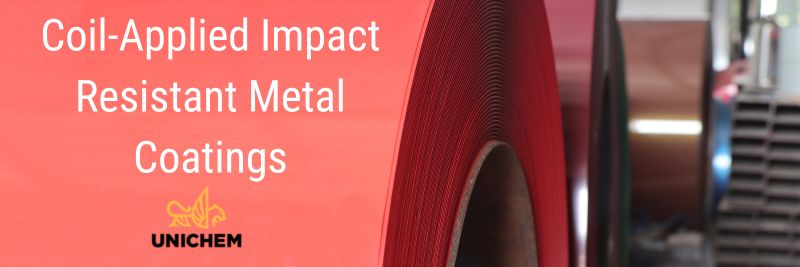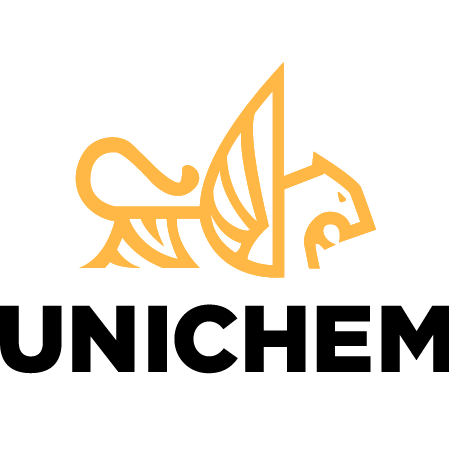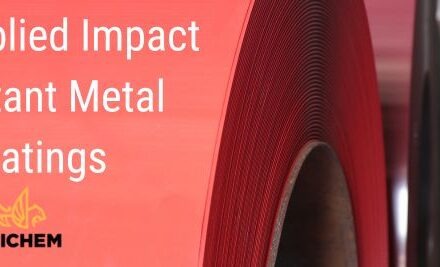
Metal components face a range of mechanical stresses long before they reach end use. From roll-forming and stamping to stacking, shipping, and installation, coated surfaces are subjected to impacts, abrasions, and handling that can compromise both appearance and protection. Conventional post-applied finishes often struggle with these challenges, leading to cracking, peeling, or inconsistent coverage.
Coil Applied Impact Resistant Metal Coatings
Coil-applied impact-resistant metal coatings are engineered to withstand this reality. Applied in a continuous, controlled process, these coatings form resilient films that resist chipping and surface damage, even under demanding fabrication and service conditions. By combining precision application with advanced resin systems, coil-applied coatings deliver the consistency and durability required for high-value industrial and consumer products.
The Mechanics of Surface Damage
When coated metal is exposed to real-world use, two main damage modes typically occur: abrasion and impact stress. Abrasion arises during handling, transport, or fabrication, as panels rub against machinery, tooling, or each other in nested stacks. Impact stress occurs when surfaces absorb blows from tools, debris, or installation forces, which can lead to cracks, chips, or delamination in weaker coatings.
According to the National Coil Coating Association’s NCCA Toolkit #22 on Abrasion Resistance, coil-coated metals are designed and tested to minimize these risks. The guide highlights how tribological challenges, such as sliding contact, edge wear, and debris abrasion, are addressed through careful resin selection, crosslinking, and film thickness control. Coil applied impact resistant metal coatings protect the substrate from physical wear, maintaining gloss, color uniformity, and adhesion under repeated stress.
The Advantages of Coil Coating for Impact Resistant Metals
One of the greatest strengths of coil-applied coatings lies in the process itself. Unlike post-applied systems, such as spray or dip finishes, coil coating is performed in a continuous line where the metal is unwound, cleaned, pretreated, coated, and cured before fabrication. This results in a uniform film build, consistent adhesion, and superior edge coverage, features that are difficult to achieve with conventional methods.
The NCCA’s “Five Benefits of Using Coil-Coated Metal” emphasizes how this process delivers films with stronger crosslinking and higher durability than post-applied coatings. Because the coating is applied before forming, it integrates seamlessly with bending, stamping, and roll-forming operations without cracking or peeling. For impact-resistant formulations, this ensures that surfaces can endure both the stresses of fabrication and the rigors of long-term use.
Advantages of Coil-Applied Impact Resistant Metal Coatings
The coil coating process offers distinct advantages when producing impact-resistant metal finishes. Unlike spray or post-applied systems, coil-applied coatings are deposited in a continuous process where the metal is cleaned, pretreated, coated, and cured before fabrication. This controlled method creates uniform film thickness, strong adhesion, and consistent surface properties across the entire coil.
Coil-applied metal coatings achieve superior durability because they are deposited before any fabrication steps take place. By curing the film before bending, stamping, or roll forming, the coating maintains its adhesion and flexibility through processes that often cause cracking or peeling in post-applied finishes.
The controlled environment of coil-applied metal coatings ensures a uniform film build and reliable crosslinking, which helps impact-resistant coatings withstand both manufacturing stress and long-term service conditions. As a result, these coatings offer consistent performance, improved appearance retention, and enhanced durability across various applications, including appliance panels, garage doors, and transportation equipment.
Abrasion and Handling Resistance in Impact-Resistant Coatings
Beyond forming stresses, coated metals are subject to ongoing abrasion and surface contact during manufacturing, transportation, and end use. Forklift handling, stacking, and installation all expose surfaces to scuffing, scratching, and incidental impact that can compromise appearance and performance if the coating is not engineered correctly.
Impact-resistant coil-applied coatings incorporate lubricity and abrasion-tolerant formulations that help surfaces withstand these mechanical interactions. By maintaining gloss and finish quality through repeated handling, they extend the product’s usable life and reduce rework, warranty claims, and downstream costs. This durability makes them especially valuable for high-visibility products, such as appliances, entry doors, and exterior panels, where both aesthetics and long-term protection are essential.
Real-World Performance and Long-Term Protection of Coil Applied Coatings
In service, coated metals are subjected to physical contact and weathering, UV exposure, and corrosive environments. Conventional post-applied finishes often lose adhesion or exhibit premature surface breakdown under these conditions. Coil-applied impact-resistant metal coatings, by contrast, form tightly crosslinked films that retain gloss and adhesion even after extended exposure to sunlight, moisture, and temperature cycling. This ensures that products like garage doors, windows, and transportation panels maintain both protective and visual integrity throughout their service life.
Why Coil-Applied Coating Systems Outperform Post-Applied Coatings
The difference comes down to process and chemistry. Coil coatings are applied to the finish before fabrication under controlled line conditions, delivering precise film thickness, optimized adhesion, and a uniform cross-linked layer across the substrate. When combined with impact- and abrasion-resistant formulations, this process produces a coating that withstands the rigors of forming, shipping, installation, and long-term use without the cracking or peeling commonly associated with conventional systems.
Impact-resistant coil-applied coatings deliver measurable value by reducing rework, extending service life, and protecting both aesthetics and performance in demanding environments. Whether used in appliances, garage doors, or transportation equipment, these coatings provide a consistent and durable solution where conventional finishes often fail.
UNICHEM develops advanced coil-applied impact-resistant coatings that help manufacturers safeguard product quality and durability through every stage of production and use. Our formulations combine engineered toughness with process efficiency to deliver proven results in demanding applications. Contact us today to learn more about our impact-resistant metal coating technologies.


